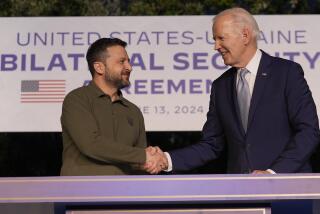Saving Face, and Little Else : Big powers’ accord on Bosnia may prove empty
- Share via
U.S. Secretary of State Warren Christopher and the foreign ministers of France, Britain, Germany and Russia--a so-called “contact group” formed at the request of Russian President Boris N. Yeltsin--met Friday in Geneva and made yet another effort to end the war in Bosnia-Herzegovina. And while their joint agreement is unprecedented in some respects, there still may be less to it than meets the eye.
France, with thousands of troops committed to UNPROFOR, the U.N. force in the former Yugoslavia, had been threatening to withdraw them, a move that could have forced a complete U.N. withdrawal. The threat was a transparent attempt to force U.S. support for the Bosnia partition terms that France and Britain both favor.
SENATE SQUEAKER: Meanwhile, earlier in the week the U.S. Senate, by a narrow 50-49 vote, passed a bill that would require the President unilaterally to break the U.N. arms embargo against the Bosnian state. Passage of the bill gave extra force to a second bill, passed by an identical tally, calling on the President to seek NATO and U.N. action ending the same embargo. While neither bill was seen as likely to become law because of a presidential veto, the votes gave the U.S. delegation added clout in dealing with the Europeans.
So to reach Friday’s agreement, both sides gave in to some degree. The United States, which had officially backed the claim of the Muslim-Croat federation to 58% of Bosnia-Herzegovina, agreed to support a plan that would give only 51%. It was the first time all the great powers had agreed to a partition formula. In exchange, the Europeans agreed to support a U.S. proposal to lift economic sanctions against Serbia only after a peace agreement is actually being implemented.
But while that compromise may help save face for diplomats meeting at Geneva, there are no indications that it will sway the combatants in the former Yugoslavia. For some very big questions remain to be answered when and if they meet at their own peace negotiations.
A ‘NEW’ SERBIA: When and if a Serb victory in Bosnia is ratified in the interests of peace, is the earlier Serb seizure of Croatian territory also ratified? If so, the Croats will fight on; if not, the Serbs will do so. A “whole” Serbia containing both the Krajina region of Croatia and the 70% of Bosnia-Herzegovina conquered during the last two years would be a Serbia with no resemblance to the historical Kingdom of Serbia or to the Serbian component of the pre-World War II “Triple Kingdom” of Serbs, Croats and Slovenes. But there is every reason to believe that nothing less than this will appease the Serbs.
And since denying Serbia this larger victory would require just the kind of commitment of blood and money that the Western allies have been unwilling to make to defend the existing Bosnian state, the proposed peace settlement would in all likelihood amount to very little. In the end, it may prove to be no more than a face-saving gesture for the great powers who, in the Balkan crisis, all seem to have been rendered virtually powerless.
More to Read
Sign up for Essential California
The most important California stories and recommendations in your inbox every morning.
You may occasionally receive promotional content from the Los Angeles Times.













